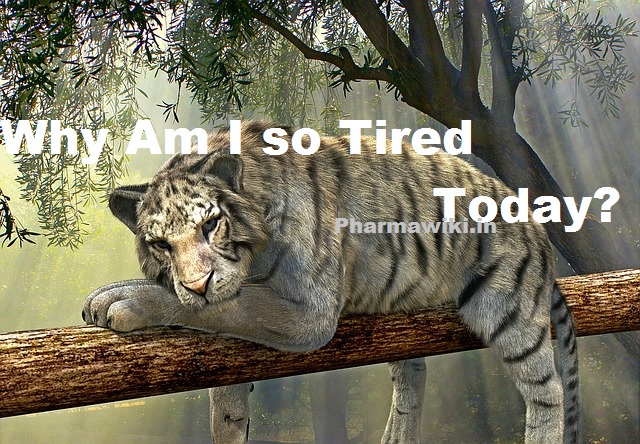Why Am I so tired?
If you are feeling constantly tired all day around or waking up at the last possible second before heading towards work then you might wonder what is wrong. You would keep asking yourself why you are so tired but you are clueless but the actual answer is fatigue. More or less fatigue stands behind as the cause of all the tiredness we experience. As far as the medical conditions are concerned there can be mental fatigue as well as physical fatigue. Fatigue and a lack of energy are a big problem for many people, but these problems can only be addressed if you know the cause. Why Am I so Tired? Today’s Causes & Reasons of Fatigue || MEN WOMEN Tiredness will give you answer.
In this article lets make you clear on your doubts.
- Why Am I So Tired Quiz?
- Why Am I So Tired Lately Female?
- Why Am I Always Tired And Have No Energy?
- Why Am I So Tired Today?
- Why Am I Always Tired And Cold?
- I’m Always Tired And Have No Energy?
- Always Sleepy No Matter How Much Sleep I Get?
- Why Am I So Tired In The Morning?
Here are the possible reasons for tiredness:

-
Why Am I So Tired Lately Female?
Sleep Debt
To our surprise, it is one of the common reasons for feeling tired. You can feel it in many ways if you aren’t getting enough sleep at night. Many people due to their too busy schedules go through life feeling too stressed and do not get all of the sleep they need to feel refreshed. Getting under the recommended 8 hours of sleep especially if the debt builds each night is not only associated with fatigue, but also impaired performance, and a greater risk of accidents. Hence, a quality sleep is inevitable to subdue fatigue.
-
Why Am I So Tired In The Morning?
Static lifestyle
When tiredness sets in you only want to sit back and relax at your home without any activity. While keeping a healthy routine of Exercising can help to increase energy and reduce tiredness. Moving around may be the best thing you can do to re-energize and eradicate fatigue. Research by the University of Georgia (UGA) in Athens discovered that when sedentary individuals completed an exercise program regularly, their fatigue improved compared with those who did not. Various experts suggest that all adults need 2 hours and 30 minutes of moderate-intensity exercise per week and muscle-strengthening activities that work all the major muscle groups on 2 or more days per week. You can plan out your activity judiciously across the week for your wellness rather than spend time watching a movie.
-
Why Am I Always Tired And Have No Energy?
Medical conditions
Depression is an important cause of tiredness associated with a condition causing abnormalities by mood-regulating chemicals called neurotransmitters in the brain. Depressed people suffer from sleep disorders and energy level. They also have trouble waking up in the morning and sleep too long. Financial problems, relationship issues, major life events, and upheavals such as moving house, unemployment, and bereavement — the list of potential stressors is never-ending. In fight or flight situations the chemicals that our body produces are toxins that can’t be used up and, over time, can damage the health. Depression often makes people feel sluggish and apathetic.
-
Always Sleepy No Matter How Much Sleep I Get?
Anaemia lets your body either have a lower than the normal number of red blood cells or it doesn’t have enough haemoglobin. Haemoglobin is the substance responsible for carrying oxygen throughout your body. When you have not enough red blood cells or too little haemoglobin your body doesn’t get enough oxygen and you feel tired or weak. Iron deficiency alone, even without anaemia, is now thought to be a cause of chronic fatigue. Eating a healthy and balanced diet can make you feel the difference after adopting the habit.
Hypothyroidism is a disease where the thyroid gland does not function fully producing insufficient thyroid hormone. Thyroid hormones control your metabolism and when its levels are low, you may have symptoms of tiredness, weight gain, and feeling cold. Thyroid disease is very common, especially in women, and affects several millions of women. Moreover, hypothyroidism can mimic depression symptoms making the condition much confusing.
-
Why Am I Always Tired And Cold?
Hepatitis induces inflammation of the liver backing for several possible reasons from infections to obesity. Many important functions in the body from breaking down toxins into manufacturing proteins that control blood clotting, to metabolizing and storing carbohydrates, and much more is done with the liver. With the inflammation of the liver, these important processes gradually come to a halt. Your body functions when halted tiredness rules you.
Heart disease, especially in the case of heart failure patients tend to feel tired always and are unable to tolerate exercise. This is because the heart loses its capacity to pump oxygenated blood to muscles and other tissues in the body effectively. It would be difficult to even carry out your daily chores, like walking or carrying your groceries inside out.
-
Why Am I So Tired Today?
Diabetes is a condition in which either the body doesn’t make enough insulin hormone produced by the pancreas or it is unable to use it the way it should. Insulin helps glucose get into the body’s cells to be used for energy production. Diabetes may cause you to feel tired all the time due to various reasons.
A disorder characterized by intense fatigue that becomes a Chronic Fatigue Syndrome when it does not improve with rest and which worsen by physical or mental exertion. It is unknown what causes this condition.
Besides all these, we have a handful of reasons such as urinary tract infection, food intolerance, glandular fever, pregnancy, vitamin and mineral deficiencies that counts for feeling tired more than usual.
Diagnostic tests
The diagnosis is done with the help of tests to confirm the underlying cause(s) of tiredness. Starting with blood tests, urine tests, imaging scans, mental health questionnaires may be necessary depending on other symptoms. Tests can help rule out physical causes, such as an infection, hormonal problems, anaemia, liver problems, or kidney problems. If any imbalance is diagnosed it would need attention and treatment such as controlling diabetes. The physician probably starts with a sleep study to rule out a sleeping disorder. To practice good sleep hygiene we have to aim to go to bed and wake up at the same time each day, even on off days to maintain a consistent routine. The environment of sleep has to be dark and quiet with the bedroom temperature at a comfortable level of 60 to 67°F (as per The National Sleep Foundation). Avoid the light and sounds from screens of a mobile phone, a TV or computer as it stimulates brain activity affecting sleep quality at least an hour before sleeping. Complete dinner within 90 minutes before going to bed. As bedtime approaches, physically and mentally slow down. Listening to some soothing music or a warm bath would refresh you and clear your mind of stressful and worrying thoughts before going to sleep. Keeping a sleep diary may also help.

